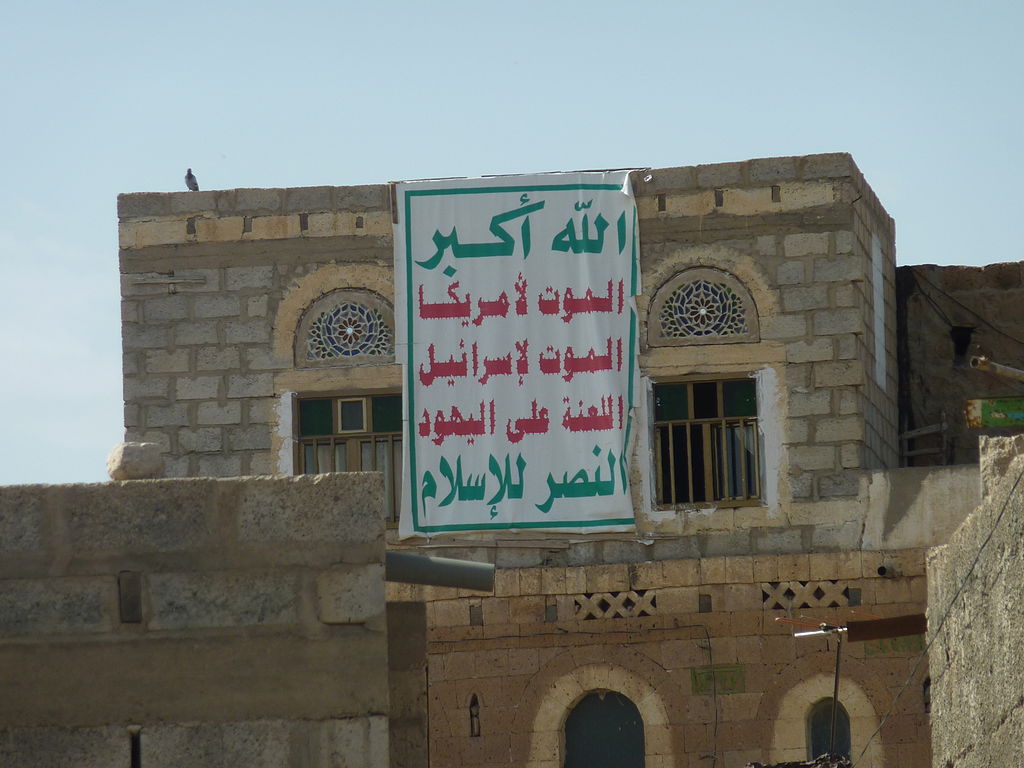
Houthi logo on a house in Yafaa-Dhamar, Yemen (2013).
“…Observers attribute the Houthis’ frantic race to recruit children to a need to cover huge losses on the fighting fronts…”
Yemen’s Ansarallah, a.k.a. the Houthis, have been indoctrinating child combatants with a militant anti-Western ideology for years. According to the accompanying excerpt from the Emirati daily al-Ittihad, the Houthis have recruited more than 30,000 children to fight in Yemen’s ongoing conflict. Ansarallah began as summer camps where children and adolescents, who were known as “Believing Youth,” were steeped in Zaydi religious doctrine, a Shiite offshoot prevalent in Yemen. They also learned to oppose stridently external involvement in their society’s affairs, particularly from the United States. As the Houthis morphed into an armed rebel movement in the early 2000s, their summer camps evolved into a recruitment pool for committed foot soldiers.
Although Ansarallah is now the de facto government of former North Yemen, it remains faithful to its roots as a network of youth training and indoctrination centers. Since April, in the context of a nation-wide truce, the group vowed to stop sending children to the battlefield. However, according to an expert cited by the Saudi-funded daily Independent Arabia, the Houthis have ramped up their recruitment activities this summer to make up for losses sustained in a failed attempt to take the city of Marib over the past year. A variety of methods are used to get parents to send their children to the camps, including extensive nation-wide media campaigns, material incentives, and various forms of pressure and blackmail. Lagging recruitment this summer, as noted in the accompanying article from the Saudi daily al-Sharq al-Awsat, has led Ansarallah to force government employees to send their children to the summer camps or risk losing their jobs.
Sources:
”الحوثي” يواصل سياسة تجنيد الأطفال
(‘Houthis’ continue child recruitment policies),” al-Ittihad (Emirati daily), 2 June 2022. https://tinyurl.com/3bdtwwmy
Majed Al-Fadael, Undersecretary of the Yemeni Ministry of Human Rights and a member of the Supervisory Committee for the Exchange of Prisoners and Abductees, told Al-Ittihad that although there are no accurate statistics on the number of child soldiers, estimates indicate that more than 30,000 children have been dragged into the fighting fronts by the Houthi militia.
Source:
”المراكز الصيفية” طعم حوثي لتجنيد الأطفال
(‘Summer Camps’: Houthi bait for recruiting children),” Independent Arabia (Saudi-funded daily), 18 June 2022. https://tinyurl.com/yckr8vyp
Observers attribute the Houthis’ frantic race to recruit children to a need to cover huge losses on the fighting fronts, especially during a nearly two-year battle to control the strategic city of Marib.
Source:
”الحوثيون يلزمون موظفيهم إحضار أبنائهم إلى معسكرات التجنيد والتعبئة
(Houthis force employees to bring their children to the recruitment and mobilization camps),” al-Sharq al-Awsat (influential Saudi daily), 20 June 2022. https://tinyurl.com/yj83zj7j
Despite intimidation, incentives, and media campaigns in which mosques and dozens of radio and television stations participated, the Houthi militias failed to convince the majority of students’ parents in the occupied Yemeni capital to enroll their children in their sectarian “summer camps.” For this reason, they have resorted to forcing employees in government institutions and departments to bring their children to the camps.
Image Information:
Image: Houthi logo on a house in Yafaa-Dhamar, Yemen (2013)
Source: Abdullah Sarhan, https://commons.wikimedia.org/wiki/File:Huthi-Logo.JPG
Attribution: CC 4.0
